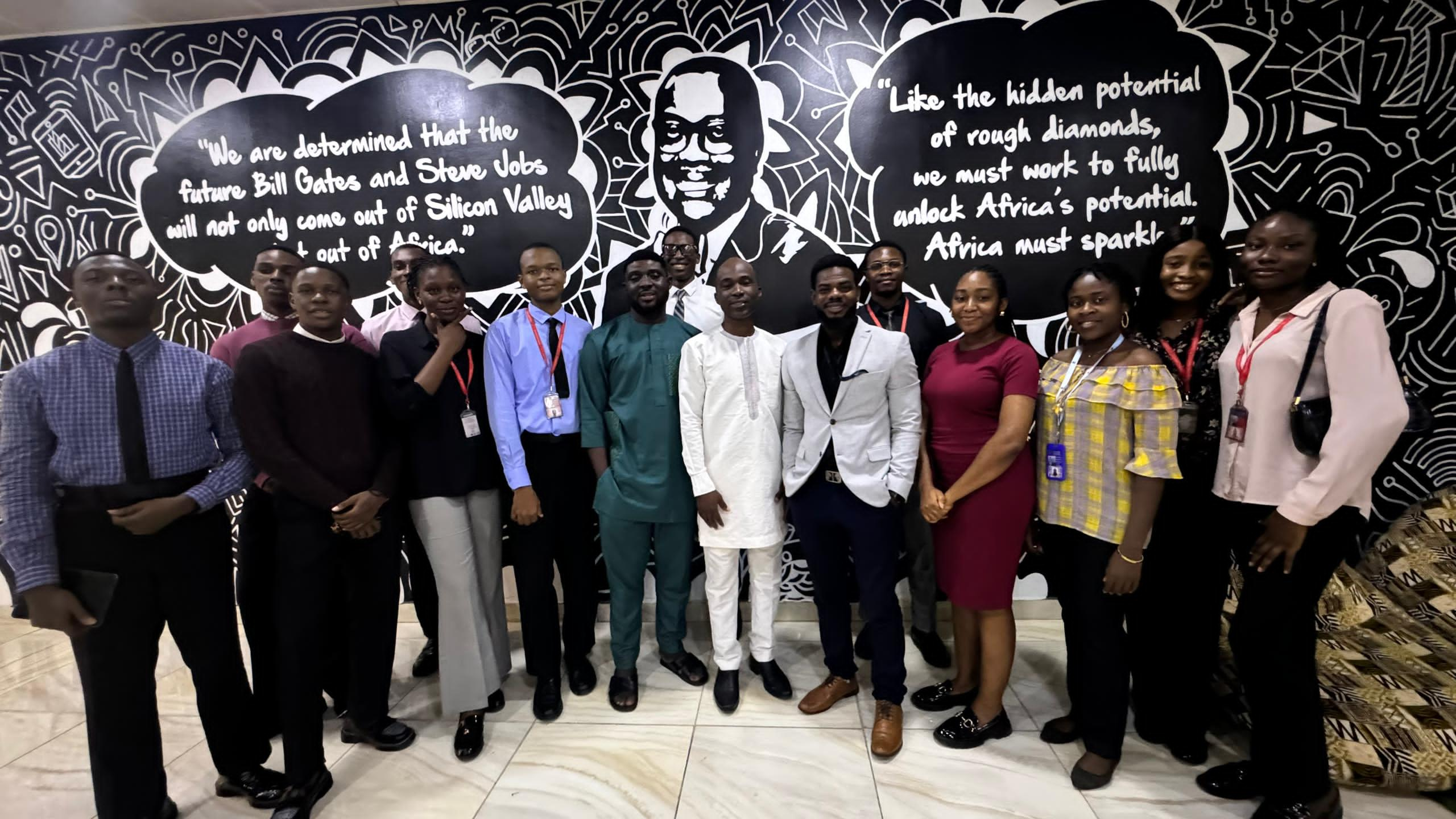News
Convenant University Students Trained on Data Analytics

By Kayode Sanny
Covenant University students have gained invaluable data analytics skills through a rigorous 2-Day Data Analytics Course held at the African Development Bank Center of Excellence.
Recently, McAnderson Institute of Technology, in partnership with the African Development Bank, launched Centers of Excellence at Covenant University and Gombe State University.
The free program brought together top industry professionals to provide hands-on training and mentorship, empowering students with critical technical skills that are increasingly essential in today’s job market.
Boluwatife Oludipin, a Google-certified Data Analyst from McAnderson, led the two-day training program, guiding students through practical exercises and real-world applications of data analysis. Oludipin’s expertise and structured approach provided students with a foundational understanding of key data tools and methods used across various sectors.
Supporting Oludipin were esteemed experts, including Frederick Oscar Lead Data Scientist from Adioo Technologies Ltd, Godwin Ebong, a Data Engineer from UK; Hope Oladele, a Data Analyst based in the UK; and Babafemi Ogundipe, an expert Software Software Engineer with Chevron. Each of these mentors contributed their vast experience and industry knowledge, facilitating interactive learning throughout the course.
The program concluded with a well-received “Ask a Mentor Anything” session, where students had the opportunity to engage directly with the panel of experts. During the session, Frederick Oscar anchored the discussion, and the mentors, who are also part of Mivant’s Mentors Platform, answered questions on careers in software engineering, data science, industry skills, and insights into working with tech and data in high-impact environments.
This open forum allowed students to explore various career paths and discuss practical strategies for building successful careers in data science and tech.

Babafemi Ogundipe, a Senior Software Engineer at Chevron, also joined the program as a mentor, sharing his extensive experience in software development and its intersection with data analytics. His contributions enriched the students’ learning experience, offering them a broader perspective on how software engineering drives innovation in the tech industry.
Also, Frederick Oscar, a Lead Data Scientist at Adioo Technologies and an expert mentor at McAnderson, served as both a mentor and facilitator for the course. With his profound expertise in data science and advanced analytics, Oscar guided students through complex data challenges, providing insights into the real-world applications of data-driven decision-making across industries.
As a mentor with McAnderson, he has played a key role in shaping the careers of numerous young professionals, empowering them to harness the power of data in real-world contexts. He shared:
“Mastering data analytics is a significant advantage in nearly every industry. Seeing the enthusiasm and commitment of these students affirms the vital role they will play in the future of Nigeria’s tech landscape.”
Godwin Ebong, a Data Engineer from UK, echoed the transformative potential of data literacy. He said:
“Data-driven decision-making is fundamental to both private and public sectors. With this training, students not only gained critical skills but also understood how their knowledge can drive innovation and development.”
Hope Oladele, a mentor and Data Science expert based in the UK, expressed his deep optimism for the students’ potential and future contributions to the tech industry:
“It’s truly inspiring to witness students who are not only eager to learn but are also ready to tackle real-world challenges using data.
The ability to analyze data effectively is more than just a technical skill—it’s a powerful tool for driving innovation and solving complex problems. This kind of hands-on training, coupled with personalized mentorship, is exactly what’s needed to prepare these students for impactful careers in data science and beyond.
Babafemi Ogundipe also shared his insights into the intersection of software engineering and data analytics:
“Data analytics and software engineering are two sides of the same coin in today’s tech landscape. It was a privilege to mentor these bright young minds and help them understand how software development and data science intersect to solve real-world problems. I’m confident that the skills they’ve gained here will position them to lead innovation in Nigeria’s growing tech industry.”
As the COO of McAnderson Institute of Technology, I am dedicated to ensuring that our programs empower students with the skills and knowledge they need to thrive in an ever-evolving technological landscape. Our hands-on approach to learning bridges the gap between theory and real-world application, preparing students for impactful careers in tech.”
– Ajiboye Ayobamidele, COO, McAnderson Institute of Technology
Real-World Learning for Nigerian Youth
Through Boluwatife Oludipin’s leadership and the support of McAnderson Institute of Technology, students experienced an immersive learning environment. By working through case studies and hands-on projects, participants learned how to navigate complex data sets, interpret trends, and understand the relevance of data in strategic decision-making.

The training also provided a valuable networking platform, allowing students to connect with experienced mentors and peers who share their career ambitions.
McAnderson Institute of Technology’s commitment to enhancing technical skills among Nigeria’s youth was evident in the success of this event, which bridged academic knowledge with industry standards. With the skills and connections gained from this training, Covenant University students are now better equipped to excel in the competitive data science and tech fields, contributing to Nigeria’s expanding digital economy.
News
Genotype incompatibility: Bauchi couple cancels wedding days to ceremony

A Bauchi State resident, Muhammad Ibrahim, has cancelled his wedding ceremony after medical tests revealed he is not genetically compatible with his fiancée, Fatima Abdulqadir.
In a Facebook post shared on November 21, 2024, Ibrahim announced the decision to call off the wedding, which was scheduled for November 29, 2024.
He explained that both he and his fiancée were AS genotype carriers, posing a significant risk of having children with sickle cell disease.
Ibrahim, a Zoology graduate from Bauchi State University, disclosed that they discovered this only last month after undergoing tests at two separate hospitals to confirm the results.
Saturday PUNCH gathered that the couple had been in a three-year relationship but had not prioritised genotype testing, assuming there would be no issues.
In the Facebook post, Ibrahim wrote, “Dear friends and family, it’s with an incredibly heavy heart that I regretfully announce the cancellation of my upcoming wedding.
“Due to unforeseen genetic compatibility issues, my partner and I have made the difficult decision to go our separate ways.”
He described the news as a “devastating shock”, adding that their inability to proceed with the wedding had left him heartbroken.
Ibrahim in a chat said some family members encouraged him and his fiancée to proceed with their plans, but they declined.
He noted that the decision was made out of concern for potential health risks associated with having children who might inherit the sickle cell gene.
Meanwhile, the couple’s decision drew sympathy from their social media friends, with many commending their courage.
Ibrahim concluded his post by asking for prayers and understanding during what he described as a “dark hour.”
“It’s for the unborn children not to suffer,” one commenter wrote.
Another added, “This is a wake-up call for everyone to prioritise genotype testing early in relationships.”
News
Angry mob sets two revenue collectors ablaze in Anambra

By Kayode Sanni-Arewa
An angry mob has reportedly set ablaze two yet-to-be-identified revenue collectors of the Anambra State Government for causing a tipper driver to ram and kill a bystander at the Old Market Road along Venn Road by Egerton Bus Stop in Onitsha, Anambra State.
The incident, which occurred on Friday, caused confusion, thereby leading to gridlock in the area.
Eyewitnesses near the scene said the tipper driver lost control of the vehicle and rammed into the bystander as the revenue touts were dragging the steering of the vehicle with him.
According to sources, the revenue collectors were chasing the tipper driver over a payment they wanted him to make before he rammed into the man.
One of the sources said, “There was chaos in Onitsha as an angry mob set ablaze about two revenue touts, while four others were lucky as they managed to escape. The revenue collectors, numbering about six were chasing the tipper driver over a certain amount they asked him to pay.
“As they were chasing him, some of them were dragging the steering with him, but unfortunately, in the process, the tipper driver lost control and rammed into a passerby, killing him instantly.
“Immediately, the revenue collectors saw the damage they had caused; they tried to flee the scene, but the Onitsha mob got angry and descended on them, setting ablaze two of them instantly while four of them managed to escape.
“This is one death too many that has been going on in Anambra in the last two years. The person who the tipper driver rammed into was a known person. We cannot continue like this anymore. These revenue touts of the state government have killed more Ndi Anambra than non-state actors.”
Another source and a trader in the area also said, “Onitsha was hot this morning at Egerton by Old Market Road. Revenuemen were dragging steering with a tipper driver because he refused to bribe them, and in the process, the vehicle ran over an innocent man.
“Then, seeing the result of their stupid action, they tried to run away. But the angry people chased and caught two of them and set them on fire.”
The videos of the incident showing the burnt corpses of the revenue collectors have been making the rounds on social media to corroborate the story.
The Chairman of the association, Ebuka Unekwe, who also confirmed the development, lamented that the revenue collectors have been a pain on the neck of tipper drivers in the last two years.
When contacted on the development, on Saturday, the Anambra State Police Command’s spokesman, SP Tochukwu Ikenga, confirmed the development, saying the police have responded swiftly to bring the situation under control.
He said, “Anambra Police responded swiftly on the receipt of the fatal accident that happened within that area.
“We are already working with the relevant authorities to ascertain what happened and find an amicable solution to such, especially on future occurrences.
News
Igbos to boycott Arise TV over Abati’s uncouth statement

The Indigenous People of Biafra lawyer, Ifeanyi Ejiofor, has called on Ndigbo to boycott Arise TV until its anchor, Reuben Abati, tenders an unreserved apology.
The former Special Adviser on Media and Publicity to former President Goodluck Jonathan, Reuben Abati, recounted during a morning programme how a former minister could not buy land for his wife in Igbo land.
Abati’s statement that Ndigbo does not sell land to non-indigenes generated condemnation from the people of the South East region.
Most X users of Igbo extraction accused Abati of committing ethnic bigotry against the group.
In reaction on Friday, on his X handle, Ejiofor alleged that he had previously taken on the former presidential spokesman for his alleged anti-Igbo statement.
“When I confronted Abati frontally on a live television interview (TheMorningShow) a few years back about his deep-rooted hatred for Igbos and our struggle for freedom from enslavement within Nigeria’s political arrangement, I was fully seized of the disturbing facts of his ethnic bigotry. It is inborn in him; thank God he could not hide it any longer,” he narrated.
The IPOB lawyer demanded Arise TV’s owner, Nduka Obaigbena, mandate Abati to apologize to Ndigbo. He called on South East indigenes to boycott the station if Abati failed to tender a public apology.
“Reuben Abati must tender an unreserved public apology to Ndi Igbo, but if Nduka Obaigbena condones his anti-Igbo sentiment (Igbophobia), then, this should be a convenient point for Igbos to boycott, in its totality, the promoting of all programmes on Arise TV platforms,” Ejiofor stated.
-

 News21 hours ago
News21 hours agoReps Demand Details Of Project Undertaken From Ministry Of Solid Minerals In 2024 Budget
-

 News21 hours ago
News21 hours agoPDP leaders, critical stakeholders endorse Hon. Teejay Yusuf for National Chairman
-

 Metro10 hours ago
Metro10 hours agoCourt remands 113 foreigners over alleged cybercrime
-

 Metro5 hours ago
Metro5 hours agoBusinessDay Journalist Finally Regains Freedom From ‘One-Chance’ Kidnappers In Abuja
-

 News11 hours ago
News11 hours agoJapa: We’ve discovered over 10,000 fraudulent foreign student acceptance letters – Canadian Authorities
-

 News21 hours ago
News21 hours agoSpeaker Abbas Decries Gross Inadequacy In Health Sector Despite Annual Allocations
-

 News10 hours ago
News10 hours agoFull List: Innoson, Mitsubishi, Dantama , Others – CAC Delists 80,000 Companies
-

 Metro10 hours ago
Metro10 hours agoGunmen kidnap journalist’s relatives, demand N50m ransom








